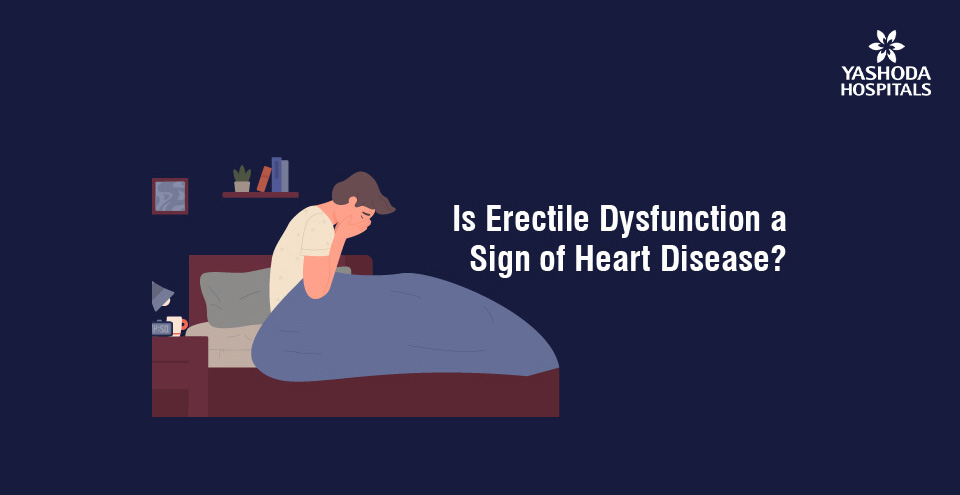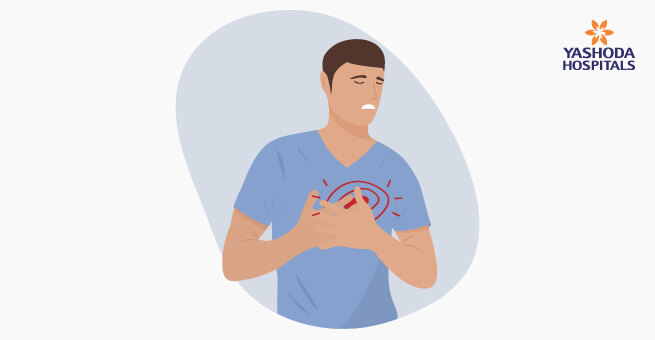Is Erectile Dysfunction a Sign of Heart Disease?

Erectile dysfunction (ED), which is defined as the inability to achieve and maintain an erection firm enough for sexual activity, can be a precursor to present or potential heart issues. Contrary to popular belief, ED is most frequently caused by underlying vascular issues rather than psychological issues. Furthermore, numerous studies have found that men with ED are more likely to develop heart disease.
Getting the appropriate treatment could help with erectile dysfunction if you have heart disease. Similarly, if you have ED, it would be beneficial to evaluate your cardiovascular function and take care of any health issues right away.
Though erectile dysfunction is more prevalent in older men, younger men are now experiencing it more frequently. Dietary changes, erratic sleep schedules, and a sedentary lifestyle are all known causes that can be modified. Furthermore, even though ED raises the risk of developing heart disease, it is effectively managed with both medication and lifestyle modifications.
Understanding the link between them and what you can do about it will help you decide what to do next.
What is erectile dysfunction?
ED, also known as impotence, is the inability to achieve and maintain a suitable erection for sexual intercourse.
It is a common disorder that primarily affects men over the age of 60 and has a negative impact on their quality of life. Endothelial dysfunction appears to be the common pathological process, and common risk factors for atherosclerosis such as diabetes, hypertension, smoking, obesity, and hyperlipidaemia are prevalent in ED patients, suggesting that managing these common cardiovascular risk factors can potentially prevent ED.
How are erectile dysfunction and heart disease related?
According to studies, erectile dysfunction is related to endothelial dysfunction and smooth muscle dysfunction, both of which increase the risk of atherosclerosis by reducing the amount of blood that reaches the heart. As a result, blood flow to the penis is compromised, resulting in ED.

What causes erectile dysfunction?
An erection requires that the nerves to the penis function properly, that blood circulation to the penis is adequate, and that there is a stimulus from the brain. A full erection will not occur if any one of these conditions or all of them are compromised.
Some of the most common causes of ED are as follows:
- Vascular disease: Vascular diseases are those that affect the blood vessels and limit blood flow to the penis. They include atherosclerosis (blockage and hardening of arteries due to accumulation of plague), hypertension (high blood pressure), and hypercholesterolemia (high blood cholesterol levels).
- Diabetes: Diabetes can cause nerve and artery damage, making it difficult to achieve an erection.
- Kidney disease: Both kidney diseases and the medications used to treat them can result in ED.
- Neurological diseases: The transmission of nerve impulses between the brain and the penis is disrupted in men who have had strokes, or other neurological trauma, making them more likely to experience ED than other men.
- Prostate cancer: Erectile dysfunction can develop as a side effect of prostate cancer treatment.
Other possible causes of ED include:
- Psychological factors (stress and performance anxiety)
- Mental health disorders
- Chronic illnesses
- Injury to the penis
- Sedentary lifestyle
- Certain medications
- Peyronie’s disease (scar tissue in the penis that results in curved, uncomfortable erections)
- History of urinary tract cancers
- Use of addictive substances such as tobacco, alcohol, or drug abuse
Did you know that the majority of Erectile Dysfunction cases are treatable?
Can erectile dysfunction be cured?
If atherosclerosis is determined to be the underlying cause, you will receive guidance on your diet and exercise regimen and cholesterol lowering medication if required. Also, if you smoke, quit or seek help because it also contributes to atherosclerosis. If these methods of self-help are insufficient, your doctor will prescribe ED specific medications.
Phosphodiesterase type 5 inhibitors alter hemodynamic factors in the short term to aid in the initiation and maintenance of penile erection. They function by raising nitric oxide levels in the smooth muscle cells of the penis, which causes smooth muscle relaxation and improves blood flow to the penis. They have been proven to be a successful and secure method of treating erectile dysfunction in people with heart diseases.
Although having an ED is not always associated with cardiovascular issues, it definitely increases the risk. Getting help for your ED and starting to modify your cardiovascular risk factors will help improve your health.
References:
- What’s the Connection Between ED and Heart Disease?
https://www.lancastergeneralhealth.org/health-hub-home/2022/august/whats-the-connection-between-ed-and-heart-disease - Cardiovascular Implications of Erectile Dysfunction
https://www.ahajournals.org/doi/full/10.1161/CIRCULATIONAHA.110.017681 - Erectile dysfunction: A sign of heart disease?
https://www.mayoclinic.org/diseases-conditions/erectile-dysfunction/in-depth/erectile-dysfunction/art-20045141 - Heart Disease & Erectile Dysfunction
https://my.clevelandclinic.org/health/diseases/15029-heart-disease–erectile-dysfunction










 Appointment
Appointment WhatsApp
WhatsApp Call
Call More
More